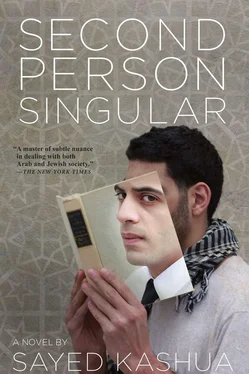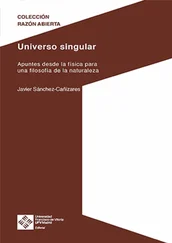“No problem,” Tarik said, looking at his watch. “I’ll close up here in a little while. What time did you say, eight thirty? I’ll go home first, take a shower, and then come over.”
For three years now the lawyer and his wife had been part of a group, along with three other couples, that met on the first Thursday of every month for dinner and a salon discussion. The topic was set in advance, usually a movie, a book, or a sociopolitical affair. The discussions opened on an intellectual note and deteriorated quickly. The men wound up talking about money and real estate — who bought, who loaned, who owed — while the women talked about the teachers and the parents in their children’s school.
The group was meeting at the lawyer and his wife’s house and since it was customary for the hosts to invite another couple or two, the kind of people whom they deemed worthy of inclusion, the lawyer and his wife — well, mostly his wife — had decided to invite Tarik. Not that they thought he was the perfect fit for the group or that he was eager to join them. They wanted him to come because they wanted to introduce him to their guests in hopes that one of them, particularly one of the women — and especially the wife of Anton the accountant, who was a faculty member at one of the teachers’ colleges in Jerusalem where the vast majority of the student body was young, female, and from one of the villages of the Galilee and the Triangle — would find a good match for the twenty-eight-year-old bachelor.
The lawyer and his wife never even considered inviting Samah and her husband. They were well-educated and well-off, more so than anyone else in the group, but were ineligible on account of their status. These meetings were for immigrant families alone. They believed that some things simply could not be shared with the locals, regardless of their material and intellectual wealth.
Sakura, the lawyer reminded himself as he skimmed down the stairs and out onto King George Street, pointing himself in the direction of the Ben Yehuda pedestrian mall. It was evening, and the early-September sun had not yet set over Jerusalem. A pleasant breeze had brought people out onto the street. It was back-to-school season, before Rosh Hashanah and the Jewish holidays, and several street musicians performed along the length of the cobblestone walkway. The lawyer fished around in his pocket and came up with the list his wife had left for him in the morning. The first item brought a smile to his lips—one inside-out maki roll — and for a moment he forgot the crowds around him in the center of town. He knew the maki roll was for his daughter and he got a kick out of the fact that his six-year-old knew exactly what kind of sushi she liked, especially since he’d only heard of sushi in law school and had tasted it for the first time two years ago, on his thirtieth birthday. And here he was on the way to Sakura, the most expensive sushi bar in the city. His wife had decided to serve a first course of sushi and the lawyer knew, as did his wife, that when the wife of Samir the gynecologist asked, while holding a soy-capped cone, “Where’s the sushi from?” there was only one acceptable response.
The thought of the gynecologist’s wife biting into a cone of sushi instead of a stuffed eggplant amused the lawyer for an instant, but the feeling passed with a dark thought, one that surfaced every now and again, that his life was a mirage, that all of it could suddenly melt away. What business did he have eating sushi? Why was he spending his evenings with these people, friends whose company he wasn’t even sure he enjoyed? Dinner would cost half a teacher’s monthly wage. He thought of his older brother, a high school teacher in the village, and imagined him sitting down to dinner with his parents, and he knew that no matter what his mother made, even if it was only scrambled eggs with green onions, it would be better than what he was about to order.
He looked at his watch as he walked through Zion Square, hoping he wouldn’t be late. He wished he had ordered in advance, as he’d told his wife. He turned right on Jaffa Road and walked to Feingold Court. The owner of the restaurant smiled at him as he walked in. The lawyer handed him the note with the order and very politely mentioned that he was in somewhat of a rush. He looked at his watch again and saw that he would be on time. “Oh, and add two bottles of white wine, please,” he told the owner, even though he knew he’d be paying double.
BOOKSTORE
“Don’t worry,” the lawyer told his wife, when she called again, a touch more anxiety in her voice. “I’ll be home on time.”
She gets so uptight before these meetings, he thought to himself. There was so much tension and unspoken competition between her and the other women in the group. Maybe she, like him, saw the monthly meetings as a kind of burden, the type of thing that was required of immigrants like themselves. He imagined his wife getting dressed in the bedroom. She had probably parked their daughter in front of a movie, and their son, if he wasn’t asleep, in the playpen, and then spent the better part of an hour deciding what to wear. Ordinarily she didn’t spend much time on her clothes, throwing on a simple shirt and a pair of slacks before going to work. As far as he could tell she also didn’t wear makeup, and she definitely wasn’t one of those women who spent hours putting on their faces in the morning. But when it came to the monthly meetings, she couldn’t afford to look rumpled or even ordinary. Perhaps she had gone out and bought something for the occasion. “Look at Faten,” he remembered her saying about Anton’s wife. “I’ve never seen her wear the same thing twice.”
His wife frequently took offense at things said by the other women in the group, especially on the matter of their children. Faten, for instance, had once noted that her daughter knew both the Hebrew and Arabic alphabets, and that she, along with other kids from the class, had been going to something called First Grade Prep, an initiative that the lawyer’s wife had not been told about.
The lawyer smiled to himself as he remembered how his wife had, for months afterward, begun spelling and penmanship lessons the second their daughter came home. “Anton’s kids are no smarter than yours,” he remembered her telling him when he tried to calm her down.
The lawyer looked at his watch and saw that it was only seven thirty. He slung his briefcase over his shoulder, picked up the brown paper bags with the sushi, and turned back up Jaffa Road, toward King George Street and his favorite bookstore. The place, located behind the Mashbir department store and a few feet from his parking lot, closed at eight in the evening. He went there once a week, whenever he was able to leave the office in time.
He pushed open the glass door, stirring the metallic wind chime.
“Hello,” the saleswoman said, looking up from her book and smiling at the lawyer.
“Hi, Meirav, how are you?”
She nodded, returning to her book, knowing that the lawyer would follow his usual browsing route and that he would find the still unshelved new arrivals.
He breathed in deeply, basking in the singular smell of used books. Oved, the café owner, a fervent supporter of independently owned businesses, had first recommended the new-and-used bookstore. The art critic, one of the regulars at the café, cited the owner’s personal touch and his ability to get all sorts of rare books.
The lawyer first came to the store three years ago, in preparation for the monthly meeting. Anton, his accountant and college friend, had invited them all over to his house for dinner and a discussion of the best seller Who Moved My Cheese?
Placing his bag and his sushi next to the counter, the lawyer remembered how mortified he had been when he brought his selection to the old saleswoman. Standing at the register, he hated Anton for making him buy the book, hated the saleswoman for her sneer and for making him feel the way he did, and, predominantly, hated himself for the many things he wanted to know but did not.
Читать дальше












